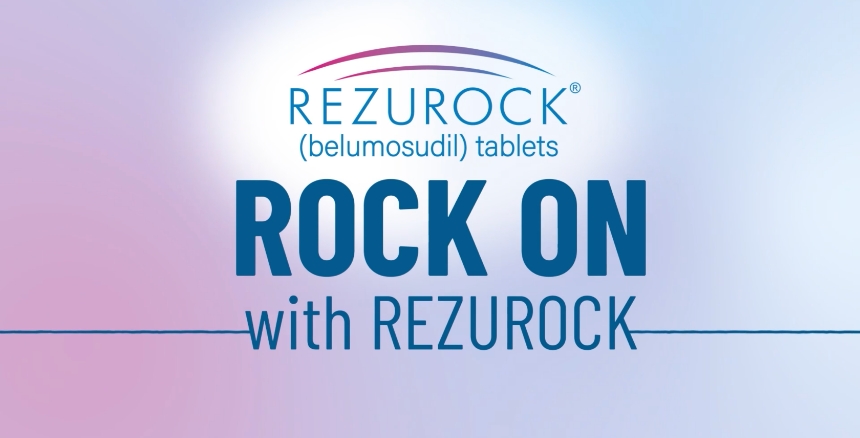For patients 12 years and older with chronic graft-versus-host disease (chronic GVHD) after 2 prior systemic treatments did not work.
Read full Important Safety Information
The place to learn
FAQs about REZUROCK and useful resources for people with chronic GVHD

FAQs
When you start a new medicine for chronic graft-versus-host disease (chronic GVHD), you may have many important questions. Below are the answers to some questions you may have about REZUROCK and chronic GVHD.
During a blood stem cell transplant, stem cells from a donor (the graft) are added to your body (the host). Donor cells may attack your body’s cells and organs because they see them as a threat.
When this happens, it can lead to chronic GVHD. Chronic GVHD causes your immune system to become unbalanced, creating too many of some cells and molecules, and not enough of others. This leads to inflammation (swelling) and fibrosis (hardening, scarring), which can damage your organs.
- Painful skin rashes, along with skin thickening or tightening
- Joint stiffness and trouble moving and using hands
- Eye problems
- Lung damage
- Stomach problems
- General decline in health, including fatigue
The severity of chronic GVHD depends on the person. Chronic GVHD may affect multiple organs and cause
Not everyone who gets a blood stem cell transplant gets chronic GVHD. Those who do may have to manage it over a long period.
REZUROCK may help treat chronic GVHD in people 12 years and older after failure of at least 2 other types of treatment. REZUROCK works by rebalancing the immune system, helping to improve chronic GVHD.
Many systems in the body work through what are called "PATHWAYS." These pathways are a series of actions that take place among cells and molecules within the body. One such pathway is called "ROCK2."
In people with chronic GVHD, this ROCK2 pathway is too active. This leads to a decrease in cells that help keep the immune system in check and an increase in cells that cause inflammation and fibrosis. The result is an immune system that is out of balance.
REZUROCK can help rebalance your immune system. It is the only approved medicine for chronic GVHD that blocks the ROCK2 pathway in your body. This may reduce the inflammation and fibrosis that can happen with chronic GVHD.
- Infections
- Tiredness or weakness
- Nausea
- Diarrhea
- Shortness of breath
- Cough
- Swelling
- Bleeding
- Stomach (abdominal) pain
- Muscle or bone pain
- Headache
- High blood pressure
The most common side effects reported by people taking REZUROCK in the 2 clinical studies were
REZUROCK may affect fertility in males and females. Talk with your health care provider if this is a concern for you.
These are not all the possible side effects of REZUROCK.
More than half of people who saw improvement did so between weeks 4 and 8.
Almost everyone who saw improvement did so by week 24.
Medicine(s) may affect everyone differently. Some people may take longer to respond, especially if they have severe disease caused by fibrosis.
75% of people (that’s 3 out of every 4 people) in the ROCKstar study saw improvement in their chronic GVHD. This includes many different types of people with chronic GVHD at different stages of their treatment journeys. For example, people who tried immunosuppressants, such as steroids, and other medicines for chronic GVHD that failed to control their symptoms, people with mild, moderate and severe chronic GVHD and people with chronic GVHD in 1 or more organs.
Some people taking REZUROCK had a reduced need for steroids and other immunosuppressants. And some people reported quality-of-life improvements, in an exploratory analysis.a
aAn exploratory analysis provides a better understanding of a problem but is not proof. It is difficult to measure quality of life because every person is different and will have a unique experience with treatment.
- The REZUROCK tablet should be swallowed whole with a glass of water. Do not crush or chew the tablet
- Take REZUROCK at approximately the same time each day with a meal. A meal is not a snack. It is about the same amount of calories as you might have for lunch or dinner
- If you miss a dose of REZUROCK, take it as soon as you remember on the same day. Take your next dose of REZUROCK at your regular time on the next day. Do not take extra doses of REZUROCK to make up for a missed dose
The REZUROCK 200-mg tablet is taken by mouth once a day with a meal.
Your health care team may choose to prescribe REZUROCK along with other medicines for chronic GVHD.
If you are prescribed REZUROCK, make sure to tell your health care team about all of the prescription and over-the-counter medicines (including proton pump inhibitors, or PPIs), vitamins and herbal products you are taking because they may affect how REZUROCK works.
How long you stay on REZUROCK will depend on multiple things, including how long it takes your body to respond to the medication, how well your body responds to it and the amount of improvement you experience.
Talk with your health care team about the best course of treatment for you. Do not change your dose or stop taking REZUROCK without discussing it first with your health care team. If you experience a side effect, be sure to tell your health care team right away.
Store REZUROCK at room temperature, ranging from 68 °F to 77 °F (20 °C-25 °C). REZUROCK should be stored in its original container to protect it from moisture. Make sure to close the cap tightly after taking your tablet. Do not discard the drying packet inside the bottle.
Talk with your health care team about enrolling in Kadmon ASSIST™ to see what support you may be eligible for.
Talk with your health care team about enrolling in Kadmon ASSIST™ to see what support you may be eligible for.
For more information about REZUROCK, please see the full Prescribing Information.
Downloadable resources about REZUROCK and chronic GVHD
Video about REZUROCK and chronic GVHD

Visit these organizations for information and assistance
Sanofi is not responsible for the content or availability of linked websites. The information provided by Sanofi is for informational purposes only and is not meant to replace the advice of a health care professional.
See people discuss the challenges of living with chronic GVHD



See if you qualify for REZUROCK

GVHD, graft-versus-host disease.
USE
REZUROCK® (belumosudil) is a prescription medicine used to treat adults and children 12 years of age and older with chronic graft-versus-host disease (chronic GVHD) after you have received at least 2 prior treatments (systemic therapy) and they did not work. It is not known if REZUROCK is safe and effective in children less than 12 years old.
IMPORTANT SAFETY INFORMATION
IMPORTANT SAFETY INFORMATION
Before taking REZUROCK, tell your healthcare provider about all of your medical conditions, including if you:
- have kidney or liver problems.
- are pregnant or plan to become pregnant. REZUROCK can harm your unborn baby. If you are able to become pregnant, your healthcare provider will do a pregnancy test before starting treatment with REZUROCK. Tell your healthcare provider if you become pregnant or think you may be pregnant during treatment with REZUROCK.
- Females who can become pregnant should use effective birth control during treatment with REZUROCK and for at least 1 week after the last dose.
- Males with female partners who can become pregnant should use effective birth control during treatment with REZUROCK and for at least 1 week after the last dose.
- are breastfeeding or plan to breastfeed. It is not known if REZUROCK passes into breast milk. Do not breastfeed during treatment with REZUROCK and for at least 1 week after the last dose.
Tell your healthcare provider about all the medicines you take, including prescription and over-the-counter medicines, vitamins, and herbal supplements. REZUROCK may affect the way other medicines work, and other medicines may affect the way REZUROCK works.
Know the medicines you take. Keep a list of them to show your healthcare provider and pharmacist when you get a new medicine.
How should I take REZUROCK?
- Take REZUROCK exactly as your healthcare provider tells you to take it.
- Do not change your dose or stop taking REZUROCK without first talking to your healthcare provider.
- Take REZUROCK 1 time a day with a meal.
- Take REZUROCK at about the same time each day.
- Swallow REZUROCK tablets whole with a glass of water.
- Do not cut, crush, or chew REZUROCK tablets.
- Your healthcare provider will do blood tests to check your liver at least 1 time a month during treatment with REZUROCK.
- If you miss a dose of REZUROCK, take it as soon as you remember on the same day. Take your next dose of REZUROCK at your regular time on the next day. Do not take extra doses of REZUROCK to make up for a missed dose.
- If you take too much REZUROCK, call your healthcare provider or go to the nearest hospital emergency room right away.
What are the possible side effects of REZUROCK?
The most common side effects of REZUROCK include:
- infections
- tiredness or weakness
- nausea
- diarrhea
- shortness of breath
- cough
- swelling
- bleeding
- stomach (abdominal) pain
- muscle or bone pain
- headache
- high blood pressure
Your healthcare provider may change your dose of REZUROCK, temporarily stop, or permanently stop treatment with REZUROCK if you have certain side effects.
REZUROCK may affect fertility in males and females. Talk to your healthcare provider if this is a concern for you.
These are not all the possible side effects of REZUROCK. Call your doctor for medical advice about side effects.
Please see full Prescribing Information.
You are encouraged to report side effects of prescription drugs to the FDA. Visit www.FDA.gov/medwatch or call 1-800-FDA-1088. You may also contact Kadmon Pharmaceuticals, LLC, a Sanofi company, at 1-800-633-1610 to report side effects.
IMPORTANT SAFETY INFORMATION
Before taking REZUROCK, tell your healthcare provider about all of your medical conditions, including if you:
- have kidney or liver problems.
- are pregnant or plan to become pregnant. REZUROCK can harm your unborn baby. If you are able to become pregnant, your healthcare provider will do a pregnancy test before starting treatment with REZUROCK. Tell your healthcare provider if you become pregnant or think you may be pregnant during treatment with REZUROCK.
- Females who can become pregnant should use effective birth control during treatment with REZUROCK and for at least 1 week after the last dose.
- Males with female partners who can become pregnant should use effective birth control during treatment with REZUROCK and for at least 1 week after the last dose.
- are breastfeeding or plan to breastfeed. It is not known if REZUROCK passes into breast milk. Do not breastfeed during treatment with REZUROCK and for at least 1 week after the last dose.
Tell your healthcare provider about all the medicines you take, including prescription and over-the-counter medicines, vitamins, and herbal supplements. REZUROCK may affect the way other medicines work, and other medicines may affect the way REZUROCK works.
Know the medicines you take. Keep a list of them to show your healthcare provider and pharmacist when you get a new medicine.
How should I take REZUROCK?
- Take REZUROCK exactly as your healthcare provider tells you to take it.
- Do not change your dose or stop taking REZUROCK without first talking to your healthcare provider.
- Take REZUROCK 1 time a day with a meal.
- Take REZUROCK at about the same time each day.
- Swallow REZUROCK tablets whole with a glass of water.
- Do not cut, crush, or chew REZUROCK tablets.
- Your healthcare provider will do blood tests to check your liver at least 1 time a month during treatment with REZUROCK.
- If you miss a dose of REZUROCK, take it as soon as you remember on the same day. Take your next dose of REZUROCK at your regular time on the next day. Do not take extra doses of REZUROCK to make up for a missed dose.
- If you take too much REZUROCK, call your healthcare provider or go to the nearest hospital emergency room right away.
What are the possible side effects of REZUROCK?
The most common side effects of REZUROCK include:
- infections
- tiredness or weakness
- nausea
- diarrhea
- shortness of breath
- cough
- swelling
- bleeding
- stomach (abdominal) pain
- muscle or bone pain
- headache
- high blood pressure
Your healthcare provider may change your dose of REZUROCK, temporarily stop, or permanently stop treatment with REZUROCK if you have certain side effects.
REZUROCK may affect fertility in males and females. Talk to your healthcare provider if this is a concern for you.
These are not all the possible side effects of REZUROCK. Call your doctor for medical advice about side effects.
Please see full Prescribing Information.
You are encouraged to report side effects of prescription drugs to the FDA. Visit www.FDA.gov/medwatch or call 1-800-FDA-1088. You may also contact Kadmon Pharmaceuticals, LLC, a Sanofi company, at 1-800-633-1610 to report side effects.

